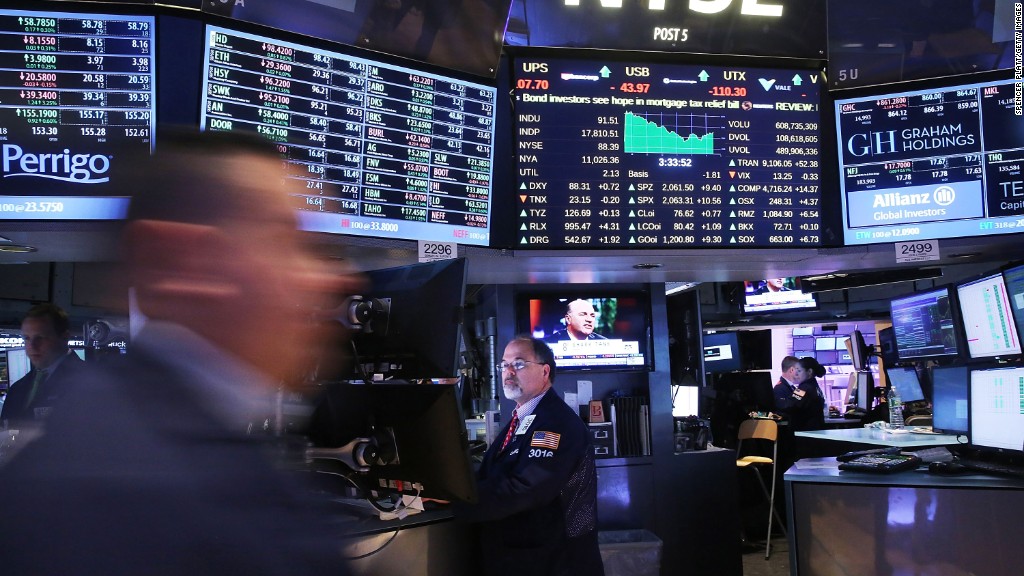
Most major stock market indexes in the U.S. are trading near their all-time highs. So why do so many investors ... and even Wall Street experts ... feel so lousy?
Here's a sampling of some of the headlines on recent research reports I've received in the past couple of days.
- Bull Market 2016: The Expensive Gets More Expensive
- New Questions Emerge About the Strength of the Economy
- Time For An August Swoon?
- Does Zika pose an Olympic-sized risk to stocks?
- Sell Everything? Even the Kids?
There is growing skepticism that stocks can keep hitting new records. Yet, the market keeps grinding higher.
Investors may be talking about how nervous they are. But the numbers tell a different story.
The VIX (VIX), a measure of volatility often dubbed Wall Street's fear gauge, is near its lowest level in a year.
And CNNMoney's Fear & Greed Index, which looks at the VIX and six other indicators of investor sentiment, has been showing signs of Extreme Greed in the market for the past month.
Concerns about the U.K. Brexit vote initially rocked the market ... but worries that Brexit could wind up being the 2016 equivalent of Lehman Brothers turned out to be short-lived.
Investors don't seem terribly concerned about the impact the U.S. presidential election will have on stocks either.
Many polls show Hillary Clinton in front, which would likely lead to more gridlock -- a situation that voters may hate but that Wall Street traders love. Nothing getting done means nothing to upset the market.
Related: Stocks are quiet. Is this the calm before the storm?
And a Trump victory isn't feared too much either. Despite controversial comments about, well, almost everything, Wall Street is betting a President Trump would be less provocative than Candidate Trump.
There's also the whole three branches of the government thing to keep Trump, or Clinton, in line.
So at the end of the day, the U.S. stock market could continue to head higher -- even though the gains may be modest -- for the foreseeable future. Here's why.
Corporate America is getting healthier. Investors are taking comfort in the fact that corporate profits should pick up in the latter half of the year. Keep in mind that the job market has now enjoyed back-to-back months of solid gains. That's good news.
"We continue to expect earnings to rebound in the second half of the year. The U.S. economy should help," wrote LPL Financial chief investment officer Burt White in a report this week.
Stocks could stay pricey for a while. When the market is trading near record highs, it's an obvious cause for concern. But with interest rates still near zero in the United States (and likely to stay there a bit longer) then that could keep the bears at bay.
"The corollary to the "cheap gets cheaper" is the "expensive gets more expensive," meaning that selling out in this market due to fear of overvaluation may be a mistake," wrote Voya Global strategists Douglas Coté and Karyn Cavanaugh in a note this week.
Coté and Cavanaugh also noted that stocks may remain attractive since Treasury bond yields haven't been this low since 1792 -- when Alexander Hamilton consolidated the debt of the colonies. (Maybe someone should write a musical about that? Heh.)
The Fed (and other central banks) is still your friend. Slow growth in the U.S. is better than no growth elsewhere. But the U.S. economy is still not close to what most average people would consider healthy.
And as long as uncertainty in China, Japan, Europe and emerging markets threaten to hurt U.S. growth, the Federal Reserve may continue to hold rates steady -- even though most economists think the central bank is very eager to eventually raise them again.
William Lynch, director of investments for Hinsdale Associates, said chances of a rate hike in September may have increased a bit due to the strong jobs report last week.
But he still thinks the odds are pretty low since a rate hike would put the Fed against the rest of the world. The Bank of England just cut rates. Japan is doing more stimulus as well.
The merger boom isn't over yet. Corporate America is loving this low rate environment. There has been a boom in merger activity lately with both public companies as well as privately-held startup unicorns selling out.
Dollar Shave Club agreed to be bought by Unilever (UL) for $1 billion last month while hot e-commerce startup Jet sold out to Walmart (WMT) this week for $3.3 billion.
Merger mania tends to lift stocks as investors bet on more deals. But mergers can help acquirers too since it gives them a way to increase their sales and earnings.
Hiter Harris, co-founder of the PNC-owned boutique investment bank Harris Williams & Co., said there continues to be "healthy demand" for mergers even as stock prices climb higher.
"For many corporations, an acquisition at almost any price allows them to show growth," Harris said. "Many companies are flush with cash."
Slow and steady wins the race. Now may not be the time to make big bets. But it's not the time to abandon the market either.
A mix of bonds and stocks makes sense for most investors since the world is not coming to an end. This isn't 2008.
Sierra Investment Management chief investment officer Terri Spath is the one who wrote the report with the "sell the kids" headline. And she concedes that's a bit hyperbolic. Patient investors should be rewarded if they don't do anything crazy.
"We are invested conservatively and believe it's better to make money slowly than just take speculative bets," she wrote. "There are still ways to make money and do it smoothly. So for now, anyway, no need to sell the kids."
Whew! I like having my two kids around.


